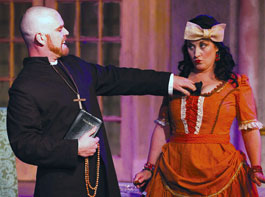home | north bay bohemian index | the arts | stage | review

Photograph by Eric Chazankin
HOLY SMOKES: Keith Baker as Tartuffe and Mary Gannon Graham as Dorine.
Fresh
Three centuries years later, 'Tartuffe' still relevant
By David Templeton
When pondering the theatrical works of Jean-Baptiste Molière, one tends to forget that the prolific Frenchman's plays were not always 350 years old. Despite the hoary titles (The Misanthrope, The Imaginary Invalid, The School for Wives), despite the rhyming verse and mysterious 17th-century references, Molière's plays were once the hot new thing in town.
Consider, for example, Molière's classic farce Tartuffe, which just opened at the Sixth Street Playhouse with a vibrantly funny production directed by Sheri Lee Miller. In the play, a pious man of God is revealed to be a conniving sexual reprobate and avaricious hypocrite. It's almost shocking how "modern-day" that scenario seems.
Tartuffe (played with smoldering, confident devilry by Keith Baker) was a penniless priest until taken in by gullible landowner Orgon (Eric Thompson). Though ruling the household with over-the-top, sin-hating strictness, Tartuffe's hypocrisy is obvious to nearly everyone in Orgon's house: his desirable wife, Elmire (Jenifer Coté), who knows she's caught Tartuffe's lascivious eye; Orgon's ready-to-rumble son, Damis (Freddie Lambert), and headstrong daughter, Marianne (Kendall Carroll); his wise older brother, Cleante (John Craven); and especially Dorine, the family's delightfully opinionated maid (Mary Gannon Graham).
When Orgon sets out to marry Marianne to Tartuffe, the family concocts a plan to unmask the unholy holy man, with increasingly alarming consequences. Tartuffe is no fool, and is one step ahead of everyone, right up to the play's tasty last-minute twist.
Emboldened by a smart, lively translation by Richard Wilbur, the cast has great fun with Molière's famously comic language. In this production, the cast uses the rhyme to comic effect, rather than allowing the rhyme to use them.
Miller (director of 2008's Death of a Salesman) has proven herself a master at breathing new life into familiar works, and she brilliantly captures the anti-establishment essence of Tartuffe by integrating coyly smart-ass anachronisms (including an inspired use of Marvin Gaye's "Let's Get It On"). Baker, as Tartuffe, avoids the common pitfall of trying too hard to make the central villain understandably, forgivably human. For the play to work, Tartuffe must be enjoyably funny, but for the ending to work, he must also be convincingly hateful. Baker's bravely subtle performance accomplishes this by maintaining a steady consistency of character.
We know he is a villain from the moment he appears (his entrance underscored strains of the famous Psycho shower music), but it is Baker's bemused menace that makes the character frightening when he needs to be. That Baker even makes Tartuffe a menacing presence when standing in the all-but-altogether, is further testament to his abilities as an actor.
Enhanced even further by an eye-candy set, John Connole and Pamela Johnson's opulent, clever costumes (ranging from gorgeous gowns and epauletted leather vests to a certain ballsy employment of thong underwear), this Tartuffe is no mere museum piece. Thanks to Miller and her able cast, this is a comedy that is 100 percent vital and alive. Even after 350 years, it can still pack a pleasing punch.
'Tartuffe' runs Thursday–Sunday through May 2 at the Sixth Street Playhouse. Thursday–Saturday at 8pm; Saturday–Sunday at 2pm. 52 W. Sixth St., Santa Rosa. $15–$28. 707.523.4185.
Send a letter to the editor about this story.
|
|
|
|
|
|